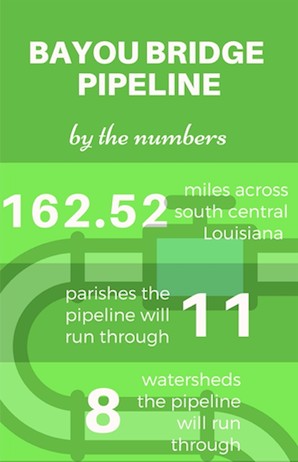Students mobilize in response to proposed Bayou Bridge Pipeline

Some Tulane students and organizations planned a teach-in Oct. 18, hoping to educate community members about the potential negative effects associated with the Bayou Bridge Pipeline.
Thousands of members of the Standing Rock Sioux Tribe garnered national attention last year when they organized large-scale protests against the building of the Dakota Access Pipeline in North Dakota. The Bayou Bridge Pipeline, proposed to St. James Parish Council this summer, represents what some say could be Southern Louisiana’s Standing Rock.
The plans for the pipeline indicate it will go through the Atchafalaya Basin in South Central Louisiana, the largest wetland in the U.S. and home to a national heritage area. The pipeline will span 162.52 miles, 11 parishes and eight watersheds.
The project, much like the Dakota Access and Keystone XL pipelines, has been met with controversy and contention. Activists and environmentalists on and off of Tulane’s campus have begun organizing efforts to advocate on behalf of those who might be affected by the Bayou Bridge Pipeline and to shed light on some of the potential consequences associated with the proposed pipeline.
On Oct. 18, Students Organizing Against Racism, Amnesty International at Tulane, Green Club and Divest Tulane teamed up to co-host a Bayou Bridge Pipeline teach-in, with the aim of initiating a conversation on Tulane’s campus about the pipeline.
“The organizers of the event recognized that we didn’t hear folks talking about the BBP on campus or even in New Orleans more generally, other than scattered teach-ins and support from local environmental justice groups,” senior Amber Thorpe, who helped organize the teach-in, said.
The clubs that facilitated and organized the teach-in hoped to tell what they believed were the untold narratives about the potential consequences and implications of the Bayou Bridge Pipeline. Primarily, they hoped to highlight the environmental, racial and class-based injustices they believe the project represents.
“Environmentally, the pipeline will significantly damage Louisianian wetlands, which will increase the risk and severity of hurricanes, flooding and sea level rise …” Thorpe said. “It threatens the livelihood and lives of thousands of people, most of whom come from marginalized and historically oppressed groups.”
The Louisiana Department of Natural Resources granted a permit for the pipeline on April 3 and denied two requests for reconsideration. The Department of Environmental Quality and the U.S. Army Corps of Engineers still need to approve the permits before construction can begin on the pipeline.
This past May, the Tulane Environmental Law Clinic filed a lawsuit in the 23rd Judicial Court on behalf of residents and environmental groups in St. James Parish. The lawsuit, which seeks to overturn the permit approved by the Louisiana DNR for the pipeline, alleges the department did not consider the effects the pipeline might have on the parish residents, who are primarily African-American, should a spill or accident occur.
According to Elizabeth Calderon, TELC clinical instructor and supervising attorney, two third-year Tulane Law students are representing the lawsuit’s two individual clients, Pastor Harry Joseph Sr. and Genevieve Butler. The clinic is also representing H.E.L.P., the Gulf Restoration Network, the Atchafalaya Basinkeeper and Bold Louisiana.
“[The Louisiana DNR] failed to follow the mandatory Coastal Use Guidelines, which serve to protect our fragile coastal areas and the people who live there, and … failed to meet its duty as public trustee of the environment under the Louisiana Constitution,” Calderon said.
Calderon said the TELC expects to file briefs in mid-November and present oral arguments at hearing in early January 2018.
Activists call the Bayou Bridge Pipeline the “tail end of the black snake” — the Dakota Access Pipeline is the head. https://t.co/YhYr4ICAst
— Lakota People's Law Project (@lakotalaw) September 17, 2017
While State Rep. Cedric Richmond (D-New Orleans) has called for a full environmental impact investigation and inquiries into the effects the pipeline could have on flood risk, drinking water and evacuation routes in St. James Parish, Gov. John Bel Edwards has publicly endorsed the project.
Supporters of the pipeline have emphasized that it would create 2,500 jobs, $17.6 million in sale taxes and $1.8 million in property taxes for the parishes it would run through. Nola.com | The Times-Picayune, however, reported that only 12 permanent jobs would directly come from the pipeline.
“The pipeline is intended to go through an area that has perpetually been negatively affected by the fossil fuel industry,” Julie Daniels, junior and Divest Tulane member, said. “Additionally, the lack of care going into the pipeline is shocking. The plans of the pipeline have not done studies on the environmental impact, and I think knowing the lack of planning and immense lack of knowledge is important to know.”
The Louisiana Bucket Brigade, an environmental activist group, published a report that documents 35 pipeline accidents between 2015 and 2016 by the same company behind the Bayou Bridge Pipeline, along with the number of spills, injuries, evacuations and damages associated with past projects. Activists and advocates, too, have planned and staged protests against the pipeline.
The protests, pushback and potential threat to traditionally underserved communities in Louisiana create the backdrop for what Thorpe said “gets to the crux of why Tulane students and New Orleans community members should care about what’s happening not too far from us.”
“As an institution that supposedly dedicates and prides itself to the motto of ‘not for oneself but for one’s own,’ we should care,” Thorpe said.
Your donation will support the student journalists of Tulane University. Your contribution will allow us to purchase equipment and cover our annual website hosting costs.
















Leave a Comment